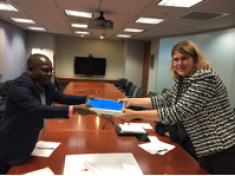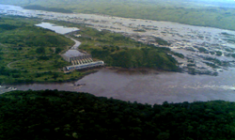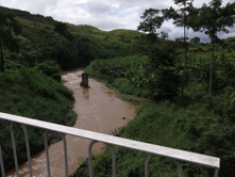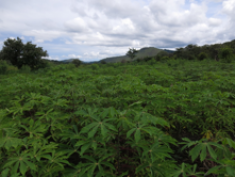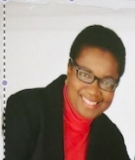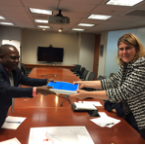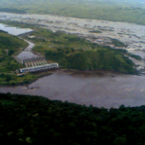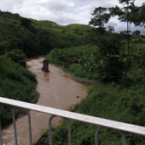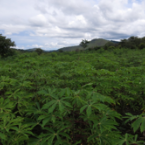Community Petition from the DRC Delivered to the World Bank
I recently had the pleasure of accompanying Mr. Jean-Marie Muanda, director of the Congolese environmental group Actions pour les Droits, l’Environnement et la Vie (ADEV), to several meetings in Washington, DC. Our goal was to present the concerns of the communities living near the proposed Inga 3 Dam site on the Congo River in the Democratic Republic of Congo (DRC) to the World Bank and other institutions that have expressed interest in supporting the project. More than 5,000 community members who will be affected by the Inga 3 project signed a petition addressed to the DRC government, the government of South Africa, the World Bank presidents, the African Development Bank, and the European Union Bank among other DRC politicians. The petition raises these major concerns:
- the proposed project and its impacts have not been communicated well or explained to the affected communities; and
- the numbers of communities who will be affected was not properly assessed.
Ms. Mieke van Ginneken, the World Bank manager for Extractives and Energy for West and Central Africa, received the petition on behalf of the World Bank president, Dr. Jim Yong Kim.
Mr. Muanda pointed out that to date, there has not been any official communication with the community to explain the project. There has been a few documents posted on the web and that there are occasional media reports that discuss the Inga 3 projects. Unfortunately, none of these forms of information are easily accessible to the majority of the Inga communities who are largely illiterate and lack access to internet.
ADEV is based in Matadi, near the Inga Falls in the DRC. The organisation works directly with the communities who will be affected by the Inga 3 project and it has been mandated by these communities to represent their interests, especially because the community's own self-help association is still to be recognized by the government of the DRC.
The Inga 3 Dam is the first phase of Africa's biggest hydropower project, the proposed Grand Inga scheme. Inga 3 is currently estimated to cost US$12 billion, but economists with expertise on dam cost overruns believe it could soar well beyond that. The World Bank approved a $73.8 million technical assistance grant for the project in March 2014 for project studies, including environmental and social impact assessments. Inga 3 is predicted to generate 4,800MW of power, but most will not go to electrifying Congo: 2,500 MW have been committed for export to South Africa and 1,300 MW will supply power to the mines in Katanga Province in the southern part of the DRC. Only 1,000 MW of non-firm power has been reserved for Kinshasa and surrounding areas, and that is dependent on the dam actually producing all the power it is designed for (previous dams in Congo have failed miserably at meeting their design output). Project documents available to date do not clearly explain how the local communities will benefit from the power that will be generated in their locale.
Inga 3 follows two previous dams, Inga 1 and Inga 2, that had a large range of negative impacts which were not adequately managed. Some communities of the people displaced by Inga 1 and 2 still await compensation, and they will be forced to move again when Inga 3 moves forward. And the dams have been very poorly maintained, resulting in years' long World Bank sponsored rehabilitation which to date has still not managed to restore the dams to full power.
In a series of meetings we had with World Bank officials, executive directors’ advisors, and US government officials, Mr. Muanda clearly outlined the communities’ grievances. He stated that the people are concerned that they have never been consulted and yet, the World Bank Project Appraisal Document states that "a participatory process with various stakeholders validated the project scope." The Project Appraisal Document further claims that Inga-affected communities participated in the public hearings held in Kinshasa and Matadi in 2013 for the purpose of presenting the terms of reference for the safeguards. In frustration, the communities appended 5,576 signatures to the petition, categorically denying that they had been involved or even invited to the meetings.
The affected communities are asking for the establishment of a consultative process that would enable them to fully participate in the discussions. They asked to have their views taken seriously and to establish a mechanism for engagement that includes appointment of an impartial mediator to facilitate communication and engagement.
Further, the communities state that they are aggrieved because the Project Appraisal Document underestimates the social and environmental impacts of the project in relation to the quantity of power that will be generated. According to the communities, this has the effect of diminishing the real impacts of the project and is a disingenuous ploy to minimize what is of value to them. Mr. Muanda stated that irrespective of the amount of power generated, the magnitude of the negative impacts experienced by the communities would not decrease, and needs to be properly assessed.
In all our meetings, Mr. Muanda pointed out that the affected communities would face many social issues resulting from dam construction and noted that Bundi Valley, which will be flooded, has good soils and is a hub for agricultural production for the people in the Bas-Congo Province. They produce good crops of banana, oranges, pawpaw and cassava in this valley. These crops are a critical source of food and livelihoods for the communities as they bring in much needed cash throughout the year. With the flooding of the valley, the people will also lose their source of firewood for cooking, and yet there is no provision for any of the hydropower to be provided to these communities.
Furthermore, the communities noted that terms of reference for the Social and Environmental Impact Assessment for the project recognizes only five villages as being affected by the project, yet the negative impacts of the project extend well beyond these five villages, including the communities residing downstream of the dam site. The communities regard this as a gross underestimation and state that a more realistic definition of the sphere of project impacts is required.
In response to some of the issues raised, the World Bank informed us that the terms of reference for the Social and Environmental Impact Assessment had been revised to include a cumulative impact assessment. The Bank reiterated that the social and environmental impact assessment is intended to produce a plan of action for compensating communities who had been affected by Inga 1 and 2 projects, in addition producing a resettlement plan for Inga 3. We were also informed that the revised terms of reference document is available to the public, although we still have to study it.
One contentious issue that we mentioned in the meetings is the release of the feasibility study reports, and that we have repeatedly asked for them without success since 2013. This, we pointed out, is contrary to the provision in the Project Appraisal Document where it is stated “The Government commits to disclose key documents concerning the project as the project progresses.” We noted that unfortunately, the DRC government has been reluctant to share this document.
Going forward, the World Bank agreed that the issue of communication as well as the appointment of a mediator to moderate communication between the World Bank, DRC government officials and the communities would be tabled for consideration with the World Bank country office in Kinshasa. The World Bank officials also agreed that they would request the DRC government to release sections of the feasibility study report that will not prejudice the tendering process to interested stakeholders, especially the environment and social sections.
We were promised that the Bank would study the petition, and that a response would be received within a few weeks. We look forward to the response not only from the World Bank but also from the DRC president. We will follow up on all issues agreed to and all promises that were made with regard to release of information. And in the meantime, ADEV and International Rivers will work to ensure that the communities are informed, and that the issue of energy access for Congolese is not put on a back burner.

